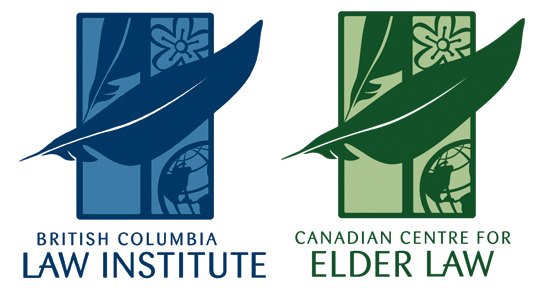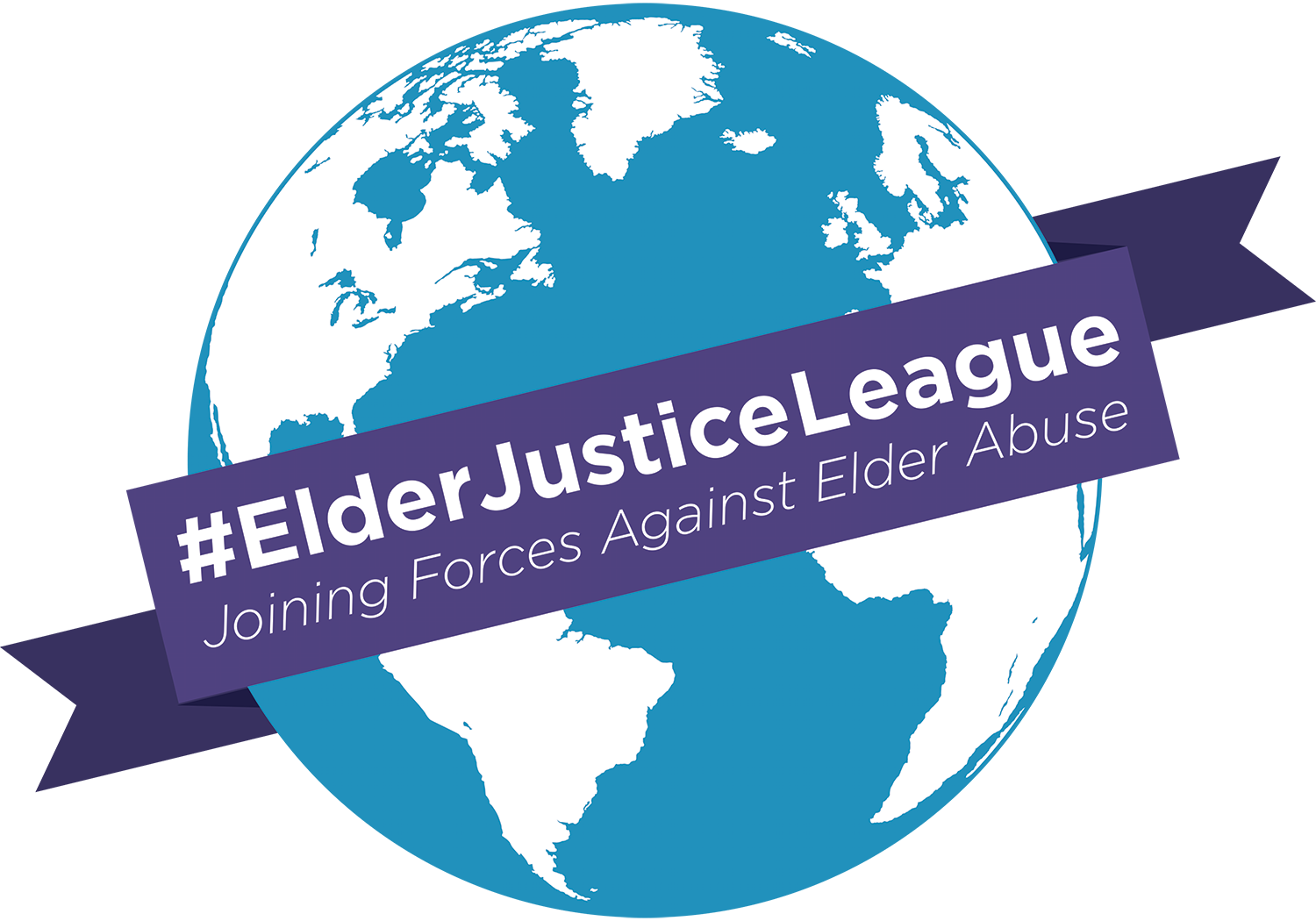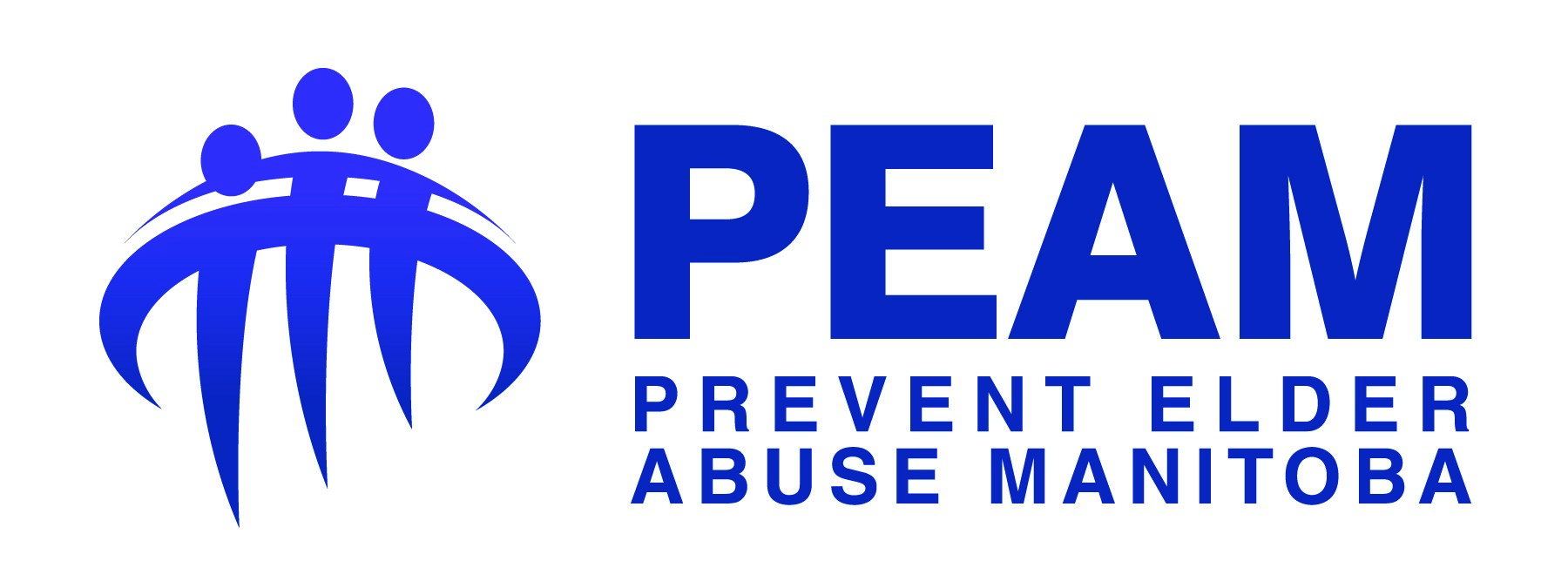Brochures and Factsheets
Few know what elder abuse looks like and fewer talk about it. So, it stays behind closed doors.
A partnership team comprising researchers from the department of Community Health Sciences at the University of Manitoba and community partners and advisors A&O Support Services for Older Adults (Manitoba), the Saskatoon Council on Aging, and the Kerby Centre, have developed the video Who Should I Tell?. It aims to increase awareness of the abuse of older adults and to foster dialogue. The goal is to encourage disclosure and discussion among older adults, family and friends.
The original video was released for World Elder Abuse Awareness Day 2021. It has successfully been helping residents of the prairies start to talk about elder abuse, regardless of language. It is now also available in French, German, Punjabi, Tagalog and Plains Cree. Click the language to view the video:
Please share this video to help your community partners, agencies, older adults, and family members. You can share your feedback with Dr. Kerstin Roger, Professor, Community Health Sciences, University of Manitoba, .
If you notice abusive situations among your friends, family, neighbors and community, it is important to talk about it. If you are experiencing abuse, talking to someone you trust is the first step in reducing the harm and staying safe. If you are unsure how to start the conversation, or if you need more information to learn about the signs of elder abuse, reach out to your local senior centre as a first step, or visit cnpea.ca. You can find helplines and support services in your Province or Territory on the CNPEA's Find Help page.
Who Can You Tell? Video:
Principal Investigator: Dr. Kerstin Roger, Professor, Community Health Sciences, University of Manitoba, .
Co-Investigators: Dr. Donna Goodridge (Sask), Dr. Christine A. Walsh (AB), Stacey Miller (A&O Support Services for Older Adults, Inc, Manitoba)
Community Advisory Committee Representatives (SCOA, Kerby Centre, A&O Support Services Inc)
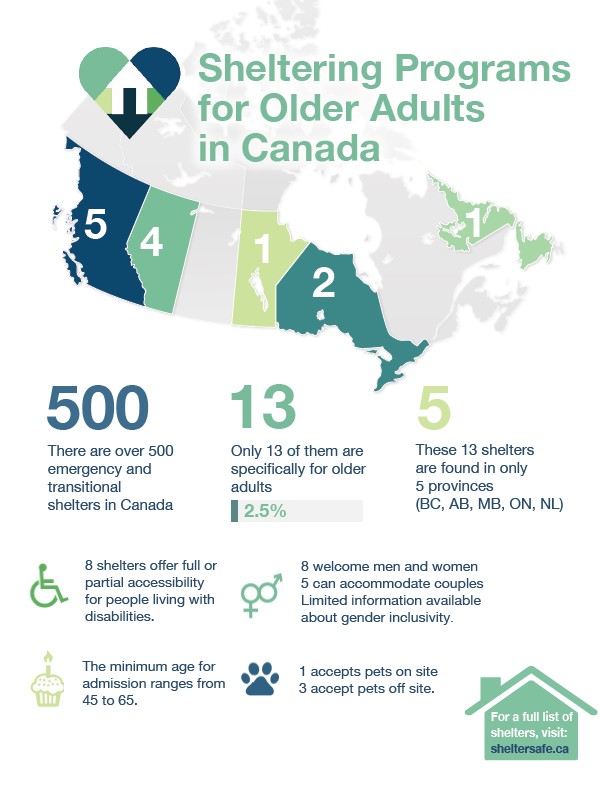 In 2022, Sage Seniors Association and CNPEA co-developed an infographic about shelters and emergency accommodations for older adults. This document offers an overview of existing services, where they are located and how they can be reached. It also highlights a striking gap in availability. There are currently only 13 sheltering services that are specifically for older adults in Canada. They are spread out across five provinces and provide varying levels of accessibility depending of factors such as disability, pet ownership, minimum age, etc. As the Canadian population ages and rates of family violence and gender-based violence continue to rise, increasing the number of emergency shelters, transition houses, and other emergency accommodations for older people is becoming a pressing issue.
In 2022, Sage Seniors Association and CNPEA co-developed an infographic about shelters and emergency accommodations for older adults. This document offers an overview of existing services, where they are located and how they can be reached. It also highlights a striking gap in availability. There are currently only 13 sheltering services that are specifically for older adults in Canada. They are spread out across five provinces and provide varying levels of accessibility depending of factors such as disability, pet ownership, minimum age, etc. As the Canadian population ages and rates of family violence and gender-based violence continue to rise, increasing the number of emergency shelters, transition houses, and other emergency accommodations for older people is becoming a pressing issue.
Click on the thumbnail to view and download the infographic.
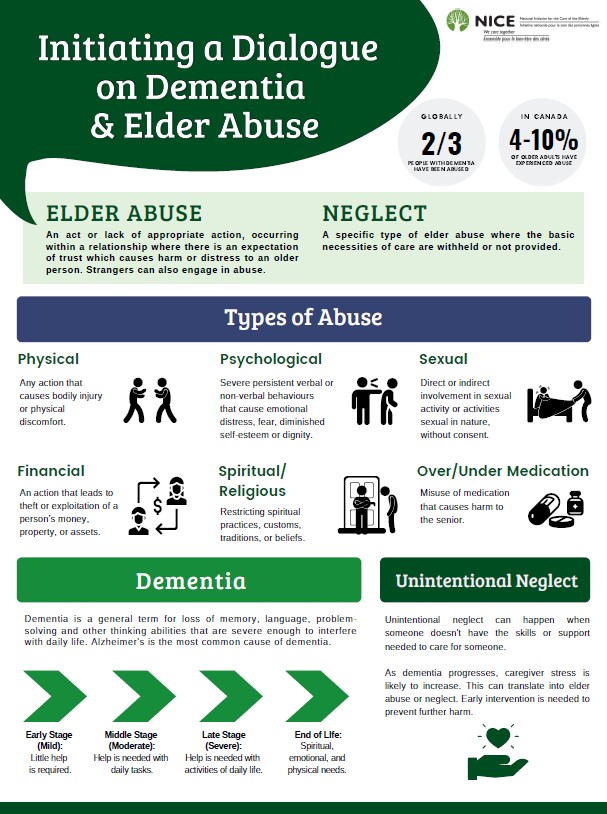 CNPEA collaborated with the National Initiative for the Care of the Elderly (NICE) and Elder Abuse Prevention Ontario (EAPO) to develop a virtual workshop and an infographic on Initiating a Dialogue on Dementia & Elder Abuse. The Alzheimer Society of Ontario and Alzheimer Society of B.C. provided crucial input along the way. Click on the image to access the infographic.
CNPEA collaborated with the National Initiative for the Care of the Elderly (NICE) and Elder Abuse Prevention Ontario (EAPO) to develop a virtual workshop and an infographic on Initiating a Dialogue on Dementia & Elder Abuse. The Alzheimer Society of Ontario and Alzheimer Society of B.C. provided crucial input along the way. Click on the image to access the infographic.
A few facts about elder abuse and dementia:
- NICE's National Prevalence Study of the Mistreatment of Older Adults in Canada revealed that older adults who experience a situation of abuse tend to turn to their peers and friends before anyone else to talk about their abuse.
- Among older adults living with dementia, increased cognitive and physical impairments highten the risk of experiencing abuse and neglect.
- According to the World Health Organization (2016), globally, approximately 2 out of 3 people living with dementia have experienced abused.
About NICE's project
- The overarching goal of the project is to educate older adults, particularly those living with dementia, as well as their caregivers, supporters and friends about elder abuse and neglect.
- NICE aims to help build a strong, informed system of support and prevention around older adults
- A peer-based approach was chosen to bring a unique perspective to older adults and community members.
- The workshops were delivered by trained older adults with the support of the National Initiative for the Care of the Elderly (NICE).
Objectives:
- Awareness: Foster a space to raise awareness about elder abuse and neglect among people who live with dementia.
- Knowledge: Provide the most up to date information and resources.
- Research: Gatther data on the effectiveness of the workshops.
- Empowerment: Support older adults and people impacted by elder abuse and neglect to speak up and intervene.
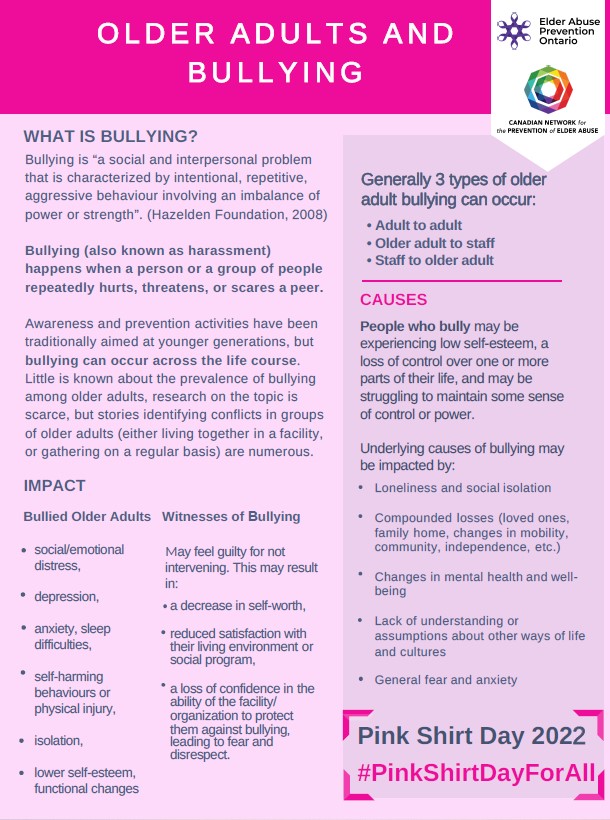 Bullying (also known as harassment) happens when a person or a group of people repeatedly hurts, threatens, or scares a peer. Bullying awareness and prevention activities have been traditionally aimed at younger generations, even though the behaviours occur across the life course and can affect older adults where they live and socialize.
Bullying (also known as harassment) happens when a person or a group of people repeatedly hurts, threatens, or scares a peer. Bullying awareness and prevention activities have been traditionally aimed at younger generations, even though the behaviours occur across the life course and can affect older adults where they live and socialize.
This factsheet summarizes
- the definition of bullying
- causes
- impacts on older adults
- strategies for prevention and
- available services in Ontario
In 2020 A&O: Support Services for Older Adults (Manitoba) and the Canadian Network for the Prevention of Elder Abuse developed a factsheet as part of the anti-bullying social media campaign #PinkShirtDayForAll to help raise awareness of bullying of older adults. In 2022 we created an Ontario-specific version which features supports available across the province of Ontario.
STYLE GUIDELINES FOR AVOIDING AGEIST LANGUAGE
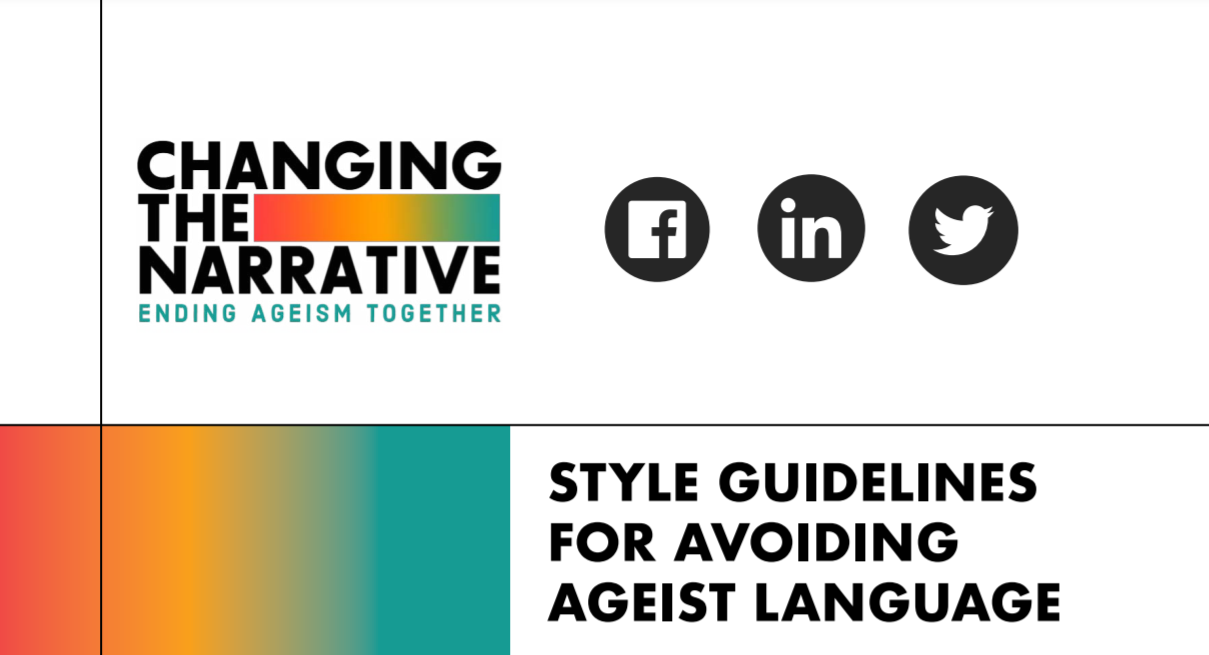 A short, easy guide to help keep ageism out of your writing. These guidelines for age-inclusive communications address:
A short, easy guide to help keep ageism out of your writing. These guidelines for age-inclusive communications address:
- What is ageism and why should we care?
- Terminology to avoid and preferable terms
- Ageist imagery vs age-positive images
- Avoiding Ageist Storylines
Source: Changing the Narrative
Page 1 of 13







